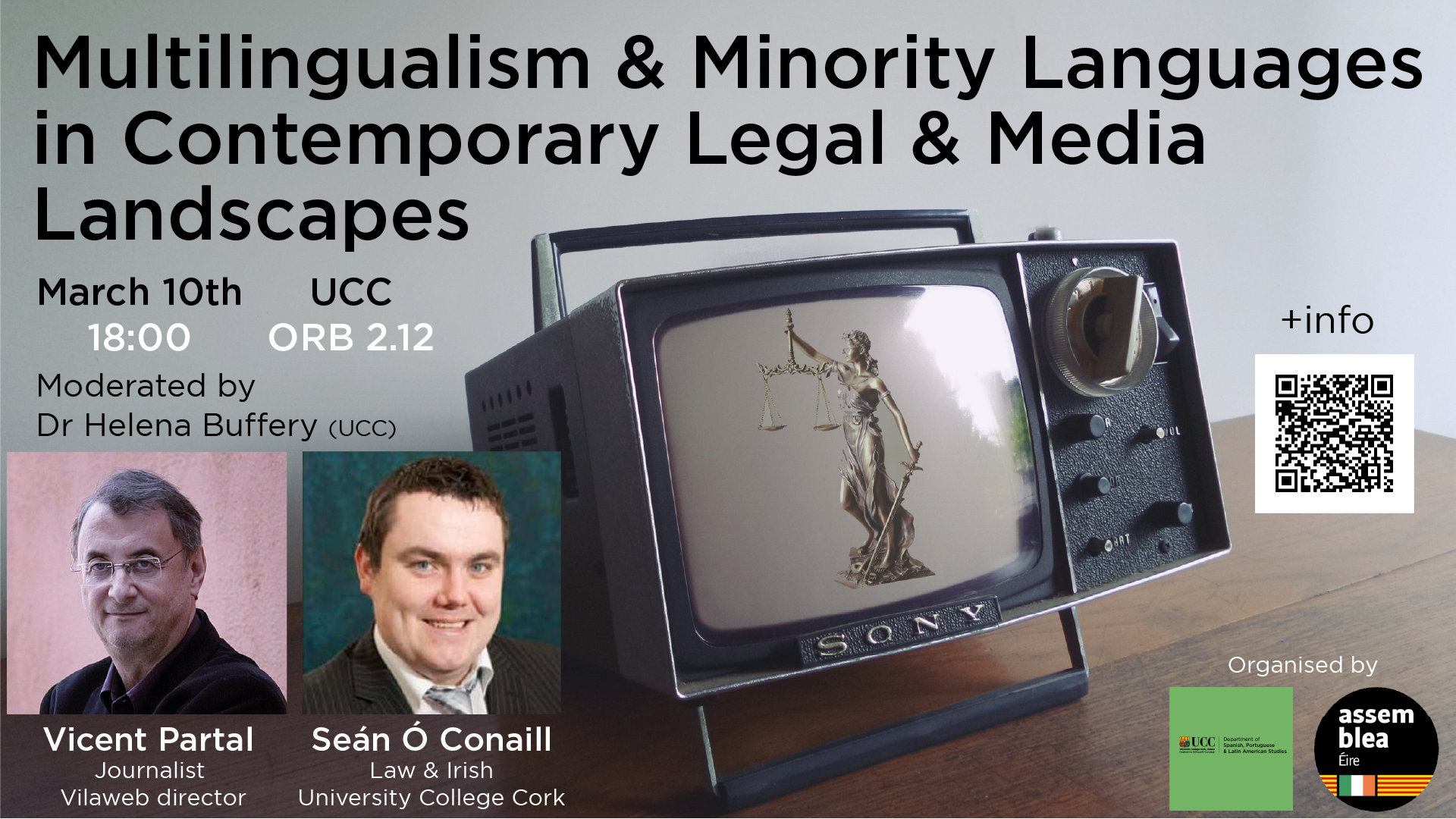Blog
Multilingualism and Minority Languages in Contemporary Legal and Media Landscapes

With Vicent Partal and Seán Ó Conaill. Moderated by Helena Buffery
March 10th – 18:00 – O'Rahilly Building 212
Catalan Journalist and creator of news outlet Vilaweb, Vicent Partal, and Law and Irish lecturer Dr Seán Ó Connail from University College Cork engages in a conversation on Multilingualism and Minority languages, from both a media and legal perspective.
The conversation with be moderated by UCC Catalan Studies Lecturer Dr Helena Buffery.
This will be a hybrid event, with the possibility of attending live at O'Rahilly Building 2.12 and watching through a streaming which will become available on the day through this link.
Speaker 1 – Vicent Partal – Catalan Journalist and director of News Outlet Vilaweb
Minoritized languages are also global languages: Lessons from Catalan
Abstract
The Internet and digitalization have revolutionized the role of languages in the world, opening windows of opportunity for minority languages such as Irish and Catalan. Because today the value of a language compared to another is no longer necessarily the number of speakers but whether or not it has the tools of globalization. If it has schools, media or official recognition, but above all if it is present in automatic dictionaries, operating systems or software, mobiles, games, etcetera. The Catalan language is a pioneer in this idea of considering itself a global language since it is present and active in all corners of globalization. Particularly in the case of the media, it has been able to create a network of publications that reach a wide variety of audiences, and my own newspaper, VilaWeb.cat, has taken on the challenge of being a newspaper with global ambitions from a national perspective. A particularly relevant position in the middle of the independence process in Catalonia and the various overlapping crises that haunt Europe and the world. In this event I will talk about the creation of VilaWeb, the oldest media outlet in Europe to be published exclusively online, and in Catalan. And how since 1995 we have evolved at the pace of the changes brought about by digitization. But I will also situate this experience and the current situation of the Catalan language and Catalonia within the framework of the new linguistic ecosystem that digitalization is bringing all over the world.
Key words: digital media, national identity, minority language, globalisation.
Speaker 2 – Dr Seán Ó Conaill – Law and Irish Lecturer at University College Cork
The Irish language and other Minority Languages – a challenge for multilingual legal systems
The Irish language, by virtue of the status conferred on it by Ireland’s 1937 Constitution is both the ‘national language’ and the ‘first official language’ of Ireland. Irish is also now recognised as a full official working language of the European Union. Although the legal situation, where English is only ‘accepted’ and ‘another official language’ paints a picture of an Ireland where Irish dominates, the reality is of course very different. The English language dominates virtually every facet of Irish life, with Irish being an also ran with there being effectively no monoglot Irish speakers. Although never recognised as such (a fact which will be explored) the Irish language is very clearly and undisputedly a minority language in Ireland.
This presents us with a series of questions; do minority languages where every speaker of that language fully understands a more dominant language need services in the minority language? Does an Irish speaker who speaks English need the state to ‘allow’ them run a court case in Irish? Do State broadcasters have to broadcast in Irish when everyone can just understand the English version? Why should the law care about minority languages?
The talk will aim to answer these questions and look at the consequences of minority languages having legal status/recognition. Examples of language laws and legal status from a number of countries will be examined and put in context with particular reference to Irish and Catalan.

